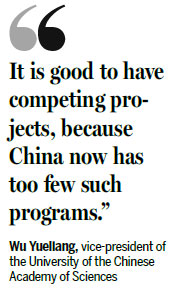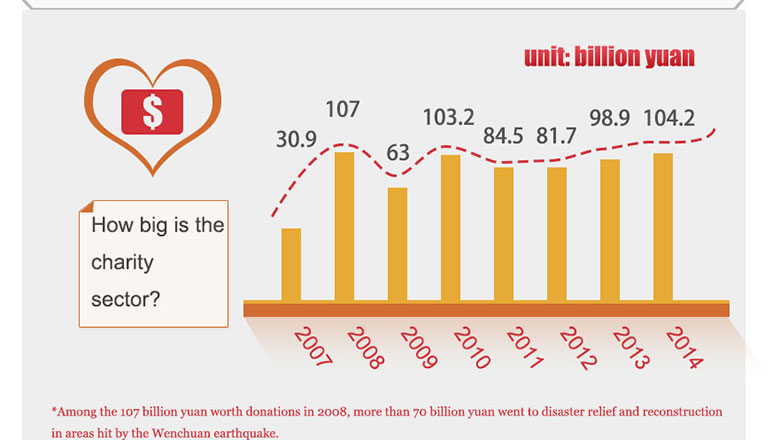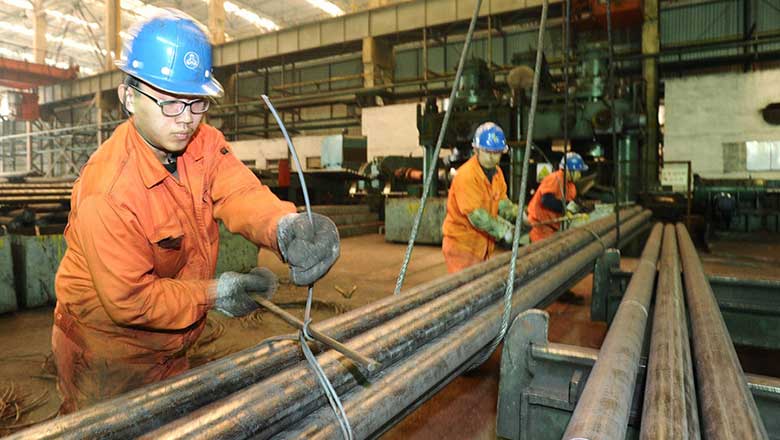Work starts on space project to find gravity waves
Updated: 2016-03-22 07:45
By Cheng Yingqi(China Daily)
|
||||||||
Ground infrastructure construction on China's gravitational wave research project, Tianqin, began on Sunday in Zhuhai, Guangdong province.
At an estimated cost of 10-20 billion yuan ($1.5-3 billion), the project plans four steps during the coming two decades to launch three satellites into high Earth orbit and detect gravitational waves.
The first step includes the construction of a 30,000-square-meter research building, a 10,000-sq-m ultraquiet cave laboratory and a 5,000-sq-m observation station on the Zhuhai campus of Guangzhou-based Sun Yat-Sen University.
"We will take steps to raise funds for the program because Tianqin is such a big project planned over such long period of time," Li Miao, director of the university's Institute of Astronomy and Space Science, told Beijing Youth Daily.
That report said the city government of Zhuhai will invest 300 million yuan in the project to get it going.
"Given the overall investment scale, the project will seek various sources of funds for each of its different parts, including financing from local governments and private companies," Li said.

On Feb 11, scientists at the Laser Interferometer Gravitational-Wave Observatory, or Advanced LOGO, in the US confirmed they had directly detected gravitational waves for the first time. That captured the interest of scientists who were engaged in related research worldwide.
A few days later, scientists at the Chinese Academy of Sciences announced that they would propose a space-based detection program by the end of this year that could be part of the European Space Agency's ELISA project.
"We have been cooperating with the European Space Agency since 2009. It has been accumulating theoretical research on this subject for three decades," said Wu Yueliang, vice-president of the University of the Chinese Academy of Sciences. "In this sense, we have an advantage over other gravitational wave research projects in China.
"It is good to have competing projects, because China now has too few such programs."
Predicted by Albert Einstein 100 years ago, gravitational waves are tiny ripples in the fabric of space-time caused by violent astronomical events.
Wu Ji, director of the National Space Science Center at the Chinese Academy of Sciences, was optimistic about funding for such speculative science during the 13th Five Year Plan (2016-20).
"With the initial success of Advanced LOGO, I think Chinese decision-makers are likely to allocate more resources to gravitational wave research in the coming five years," he said.
chengyingqi@chinadaily.com.cn
(China Daily 03/22/2016 page4)
- Xi: Talks 'only correct way' for China, ROK
- Xi to Obama: Disputes should be managed
- Cypriot court remands in custody man suspected of hijacking EgyptAir flight
- Govt eyes luxury tourists amid concerns over safety
- Sleep tight and don't let sharks bite at Paris aquarium
- Aung San Suu Kyi appointed as Myanmar's new foreign minister

 Charity Law to give good Samaritans a helping hand
Charity Law to give good Samaritans a helping hand
 Top Chinese leaders attend voluntary tree-planting in Beijing
Top Chinese leaders attend voluntary tree-planting in Beijing
 Zhouzhuang water town viewed through artistic eyes
Zhouzhuang water town viewed through artistic eyes
 8 trends of major price movements gauging China's economy
8 trends of major price movements gauging China's economy
 Microsoft embraces artificial intelligence
Microsoft embraces artificial intelligence
 Yao Ming introduced to Hall of Fame
Yao Ming introduced to Hall of Fame
 The world in photos: March 28 - April 3
The world in photos: March 28 - April 3
 Discover beautiful China in spring blossom (V)
Discover beautiful China in spring blossom (V)
Most Viewed
Editor's Picks

|

|

|

|

|

|
Today's Top News
Marriott unlikely to top Anbang offer for Starwood: Observers
Chinese biopharma debuts on Nasdaq
What ends Jeb Bush's White House hopes
Investigation for Nicolas's campaign
Will US-ASEAN meeting be good for region?
Accentuate the positive in Sino-US relations
Dangerous games on peninsula will have no winner
National Art Museum showing 400 puppets in new exhibition
US Weekly

|

|







